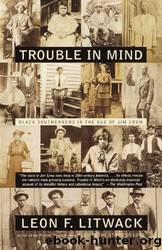Trouble in Mind: Black Southerners in the Age of Jim Crow by Leon F. Litwack

Author:Leon F. Litwack [Litwack, Leon F.]
Language: eng
Format: epub
Publisher: Knopf Doubleday Publishing Group
Published: 2010-11-17T07:00:00+00:00
Holbert and his employer had quarreled before the murder, but there was no evidence to implicate Holbertâs wife. Two blacks, mistaken for Luther Holbert, had already been slain by a posse.
When a mob meted out lynch justice in Fort White, Florida, in 1893, they did so with a ferocity that was becoming all too typical. Trains brought in additional participants and spectators from surrounding cities. After a mock trial, the prolonged execution began. âEvery one knew what the crowd meant,â a resident noted afterward, âbut no one expected such horrible butchery.â They sawed at the victimâs throat, cut off both his ears, cut out one eye, and stuffed handkerchiefs in his mouth to stifle his âawful screams.â Stabbing him repeatedly, the lynchers came close to cutting out his backbone. He was then dragged two blocks before the crowd emptied their guns into his body. One year earlier, near Memphis, the same violence had been inflicted on Lee Walker, removed from the county jail and hanged from a telegraph pole after his skin had been cut to ribbons by the mob. As Walker swung on the pole, blood streaming down his body from the knife wounds, the crowd hurled expletives at him. âThe Negro died hard,â one observer wrote. âThe neck was not broken ⦠and death came by strangulation. For fully ten minutes after he was strung up the chest heaved occasionally and there were convulsive movements of the limbs.â But the crowd had not finished. Throwing the body into a fire, they watched with âastonishing coolness and nonchalanceâ as it burned. Finally, the relic hunters moved in to retrieve portions of the rope and what was left of the charred body.
Once having settled on lynch justice, mobs were not overly scrupulous about determining the guilt of the black victim. The idea, after all, as one black observer noted, was to make an example, âknowing full well that one Negro swinging from a tree will serve as well as another to terrorize the community.â After a barn burning near Columbus, Mississippi, suspicion fell on the son of Cordelia Stevenson. Not being able to locate him, a mob of whites settled on his mother, seized and tortured her, and left her naked body hanging to the limb of a tree for public viewing. A jury rendered the usual judgment in such cases, deciding she had come to her death at the hands of persons unknown.
Neither women nor entire families escaped the savagery of white mobs. Bessie McCroy, along with her son and daughter, were removed from a jail in Carroll County, Mississippi, and taken to the edge of town, where a crowd of five hundred men hanged them and riddled their bodies with bullets. Members of a mob in Okemah, Oklahoma, entered the local jail to seize Laura Nelson, accused of murdering a sheriff; they then raped the black woman before hanging her along with her teenage son. When a white farmer in Gray, Georgia, was found dead in his home, suspicion fell on Will Green and his seventeen-year-old son.
Download
This site does not store any files on its server. We only index and link to content provided by other sites. Please contact the content providers to delete copyright contents if any and email us, we'll remove relevant links or contents immediately.
| Africa | Americas |
| Arctic & Antarctica | Asia |
| Australia & Oceania | Europe |
| Middle East | Russia |
| United States | World |
| Ancient Civilizations | Military |
| Historical Study & Educational Resources |
The Dawn of Everything by David Graeber & David Wengrow(1685)
The Bomber Mafia by Malcolm Gladwell(1618)
Facing the Mountain by Daniel James Brown(1542)
Submerged Prehistory by Benjamin Jonathan; & Clive Bonsall & Catriona Pickard & Anders Fischer(1444)
Wandering in Strange Lands by Morgan Jerkins(1406)
Tip Top by Bill James(1402)
Driving While Brown: Sheriff Joe Arpaio Versus the Latino Resistance by Terry Greene Sterling & Jude Joffe-Block(1361)
Red Roulette : An Insider's Story of Wealth, Power, Corruption, and Vengeance in Today's China (9781982156176) by Shum Desmond(1344)
Evil Geniuses: The Unmaking of America: A Recent History by Kurt Andersen(1338)
The Way of Fire and Ice: The Living Tradition of Norse Paganism by Ryan Smith(1322)
American Kompromat by Craig Unger(1305)
It Was All a Lie by Stuart Stevens;(1291)
F*cking History by The Captain(1288)
American Dreams by Unknown(1277)
Treasure Islands: Tax Havens and the Men who Stole the World by Nicholas Shaxson(1251)
Evil Geniuses by Kurt Andersen(1247)
White House Inc. by Dan Alexander(1204)
The First Conspiracy by Brad Meltzer & Josh Mensch(1165)
The Fifteen Biggest Lies about the Economy: And Everything Else the Right Doesn't Want You to Know about Taxes, Jobs, and Corporate America by Joshua Holland(1112)
